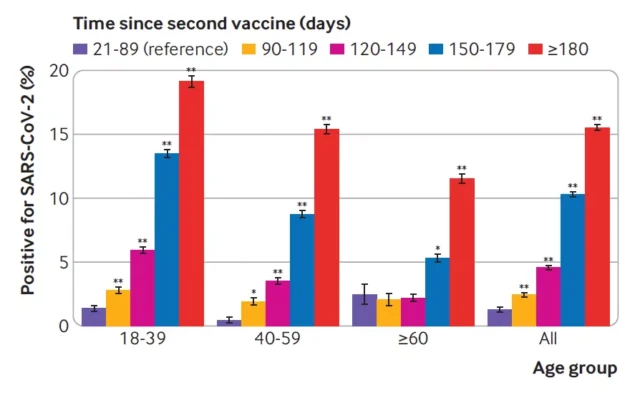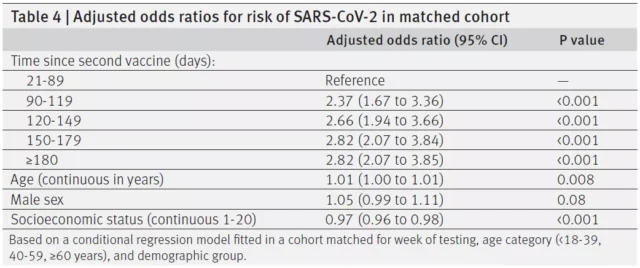COVID-19 vaccines become much less effective after three months?
- Normal Liver Cells Found to Promote Cancer Metastasis to the Liver
- Nearly 80% Complete Remission: Breakthrough in ADC Anti-Tumor Treatment
- Vaccination Against Common Diseases May Prevent Dementia!
- New Alzheimer’s Disease (AD) Diagnosis and Staging Criteria
- Breakthrough in Alzheimer’s Disease: New Nasal Spray Halts Cognitive Decline by Targeting Toxic Protein
- Can the Tap Water at the Paris Olympics be Drunk Directly?
COVID-19 vaccines become much less effective after three months?
- Should China be held legally responsible for the US’s $18 trillion COVID losses?
- CT Radiation Exposure Linked to Blood Cancer in Children and Adolescents
- FDA has mandated a top-level black box warning for all marketed CAR-T therapies
- Can people with high blood pressure eat peanuts?
- What is the difference between dopamine and dobutamine?
- How long can the patient live after heart stent surgery?
COVID-19 vaccines become much less effective after three months?
How long can the COVID-19 vaccine protect? Large-scale studies have shown that after three months, the risk of breakthrough infection has risen sharply.
At the end of 2020, the US FDA urgently approved two mRNA vaccines of Moderna and BioNTech / Pfizer for the prevention of COVID-19 pneumonia (COVID-19) .
Due to their excellent protective effects, these two mRNA vaccines have been quickly promoted, and Israel is one of them.
However, Israel, which has been vaccinated on a large scale, started to increase the COVID-19 infection rate again in June this year.
Worldwide, large-scale vaccination has helped control the spread of the COVID-19 epidemic.
But even in countries with high vaccination rates, the COVID-19 infection rate is still not low today, and many people have breakthrough infections.
Researchers believe this is due to the immunity to the COVID-19 virus brought by vaccination over time Gradually lost .
Monitoring the elapsed time after vaccination and the risk of infection can help answer questions such as whether the third booster is necessary and when is the best time to get a booster.
November 25, 2021, ” British Medical Journal ” (BMJ) published a study entitled: the Elapsed Time Operating since BNT162b2 Vaccine and Risk of Infection of SARS-CoV-2: negative Design Study the Test research papers.
The study showed that 90 days after receiving the second dose of Pfizer-BioNTech’s COVID-19 mRNA vaccine, the risk of contracting the COVID-19 virus began to gradually increase.
The results of this study confirmed that Pfizer-BioNTech’s mRNA vaccine provided excellent protection in the first few weeks after vaccination, but over time, the vaccine’s protective effect on some people began to weaken.
Researchers checked the electronic health records of 80057 Israeli adults (average age 44) who underwent PCR testing at least three weeks after the second shot and had not been infected with the new coronavirus before.
Among the 80057 participants, 7973 (9.6%) had a positive test result. These people were then matched with negative controls of the same age and race who were tested in the same week.
The results showed that the proportion of positive results began to increase over time after the second vaccine injection.
Specifically, in all age groups, 1.3% of participants tested positive 21-89 days after the second vaccine injection, which increased to 2.4% after 90-119 days; increased to 4.6% after 120-149 days; It increased to 10.3% after 150-179 days; it increased to 15.5% after 180 days or more.

Researchers believe that these data remind us that after the second vaccine injection, the risk of contracting the new coronavirus has increased significantly over time.
Specifically, after taking into account other potential influencing factors, compared with the first 90 days after the second vaccination, the risk of infection in all age groups is 2.37 times higher after 90-119 days; after 120-149 days 2.66 times; 2.82 times higher after 150-179 days; 2.82 times higher after 180 days or more.

The researchers said that this study is subject to some conditions. In addition, family size, population density, and COVID-19 mutant strains may all have an impact on the results of the experiment.
But this is a large-scale study of people who have received the same vaccine. The research team has conducted a detailed analysis of the statistical data, so overall, the conclusion is reliable.
The research team finally concluded that in individuals who received two doses of Pfizer-BioNTech’s mRNA vaccine, the protective effect appeared to decrease over time, compared with the protection provided within the first 90 days after the completion of the vaccination, the breakthrough after 90 days The risk of infection gradually increases .
This shows that the third booster shot is necessary, and it is best to start the booster shot 90 days after the first two shots are completed.
Paper link:
https://www.bmj.com/content/375/bmj-2021-067873
COVID-19 vaccines become much less effective after three months?
(source:internet, reference only)
Disclaimer of medicaltrend.org
Important Note: The information provided is for informational purposes only and should not be considered as medical advice.



